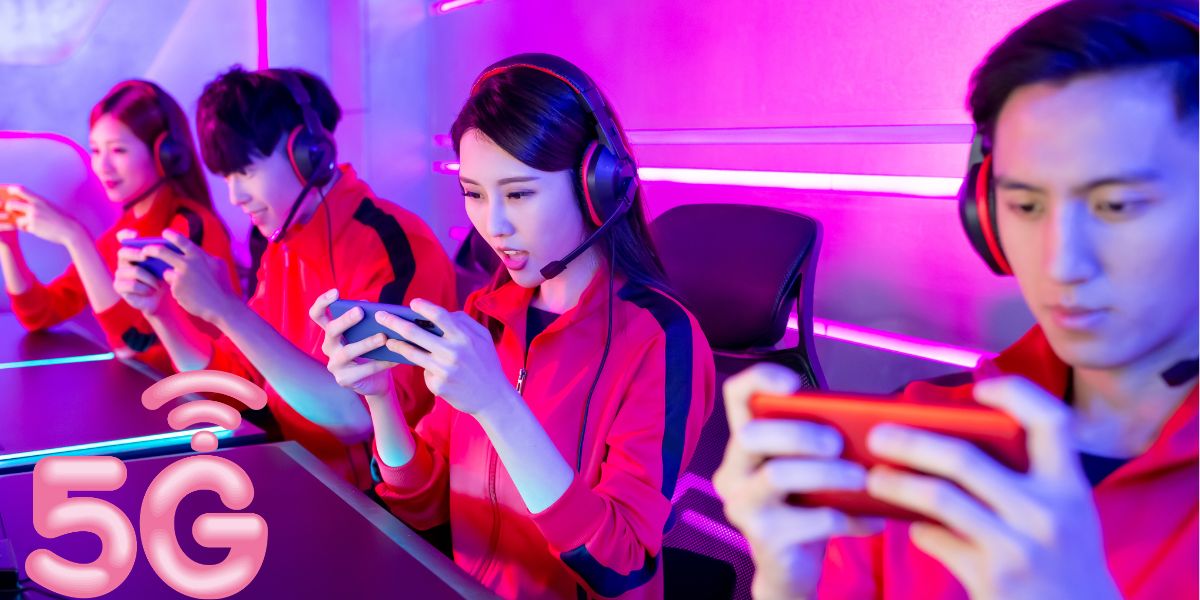Is 5G Really Faster Than 4G? The creation of 5G innovation has brought a wave of fervor and expectation. With ensures of lightning-speedy speeds and unheard of network, numerous people are pondering, **”Is 5G truly quicker than 4G?”** In this article, we will find the varieties between 5G and 4G, dig into the mechanical progressions, and confirm whether 5G lives as much as its buildup.
Key takeaways
- Speed: 5G can provide speeds that can be considerably better than 4G. While 4G speeds usually vary from 20 to a hundred Mbps (megabits in step per second), 5G can probably reach speeds exceeding 1 Gbps (gigabit in line with 2nd), with a few superior implementations targeting up to ten Gbps.
- Latency: 5G has decreased latency in comparison to 4G. Latency refers to the put off before a transfer of records starts offevolved following an education. 4G latency is typically around 30-50 milliseconds, whereas 5G can reduce this to one millisecond or much less, enhancing actual-time verbal exchange and responsiveness.
- Capacity: 5G networks can take care of many more gadgets simultaneously than 4G. This multiplied capability is critical for helping the developing number of related gadgets and the Internet of Things (IoT).
- Frequency Bands: 5G makes use of a much broader variety of frequencies, such as better-frequency millimeter waves, which permit quicker record transfer but have a shorter variety and reduced penetration via boundaries compared to the decreased frequencies used by 4G.
- Network Architecture: 5G utilizes a greater advanced network structure with technology that includes community cutting and area computing, which enhance performance and enable tailored services for unique use cases.
- Real-World Impact: In practice, the actual speed and overall performance enhancements of 5G over 4G can range based on region, community congestion, and the particular 5G generation deployed (e.g., low-band, mid-band, or excessive-band).
Understanding 4G Technology
What is 4G?
4G, brief for the fourth generation of mobile community generation, changed into a great bounce from its predecessor, 3G. Launched in the overdue 2000s, 4G supplied faster internet speeds, progressed connectivity, and supported excessive-definition cellular TV and video streaming.
| Feature | 4G LTE | 5G NR (New Radio) |
|---|---|---|
| Maximum Theoretical Speed | Up to 100 Mbps (in practice often 30-60 Mbps) | Up to 10 Gbps (in practice often 100-500 Mbps) |
| Latency | 30-50 ms | 1-10 ms |
| Frequency Bands | Below 6 GHz (Sub-6 GHz) | Below 6 GHz (Sub-6 GHz) and above 24 GHz (mmWave) |
| Bandwidth | Up to 100 MHz | Up to 400 MHz (Sub-6 GHz) and much wider channels in mmWave |
| Network Capacity | Moderate | High, with support for more devices per square kilometer |
| Peak Data Rates | Lower compared to 5G | Significantly higher, especially in mmWave bands |
| Coverage | Good, with established infrastructure | Varies; excellent in urban areas but limited in rural areas for mmWave |
| Device Density | Lower compared to 5G | Higher, supporting more devices per unit area |
| Use Cases | Mobile internet, video streaming, online gaming | Enhanced mobile broadband, IoT, autonomous vehicles, smart cities |
How Fast is 4G?

How Fast is 4G?
4G networks can provide dowdownloadeeds ranging from five to twelve Mbps (megabits according to second) and add speeds from 2 to five Mbps. In ideal situations, speeds can attain up to one hundred Mbps, making sports like streaming, gaming, and surfing a good deal smoother compared to 3G.
Limitations of 4G
Despite its benefits, 4G has its obstacles. Network congestion, coverage gaps, and the strain from more and more linked gadgets can lessen overall performance. This is where 5G steps in to deal with these challenges.
The Evolution to 5G
What is 5G?
5G, the fifth era of the ELL community era, ambitions to revolutionize the way we connect. It promises quicker speeds, decreased latency, and the potential to attach extra devices simultaneously.
Key Features of 5G
- Higher Speeds: 5G networks are designed to supply dowdownloadeeds of up to ten Gbps, drastically quicker than 4G.
- Low Latency: Latency, the time it takes for facts to travel from one factor to some other, is anticipated to be as low as 1 millisecond on 5G.
- Increased Capacity: 5G can cope with greater gadgets per square kilometer, decreasing network congestion.
- Enhanced Connectivity: 5G helps the Internet of Things (IoT) by way of allowing extra gadgets to attach and speak seamlessly.
How Does 5G Achieve These Improvements?
5G achieves its advanced overall performance through numerous technological advancements, along with:
- Millimeter Waves: These are higher frequency waves that carry extra facts but have shorter levels.
- Small Cells: These are miniature base stations that improve coverage and capacity.
- Massive MIMO: This technology makes use of more than one antenna to ship and obtains more statistics simultaneously.
- Beamforming: This focuses alerts toward precise customers rather than broadcasting in all directions, improving performance and speed.
Comparing 5G and 4G: Is 5G Raster Than 4G?
Speed Comparison
When asking, **”Is 5G better than 4G?”**, the solution is a resounding yes. On average, 5G networks offer speeds that might be up to one hundred times faster than 4G. In this responsibilities that took mins on 4G can be finished in seconds on 5G.
Latency Comparison
The low latency of 5G is one of the maximum sizable blessings over 4G. While 4G networks commonly have a latency of runaround milliseconds, 5G goals for simply 1 millisecond. This drastic discount in latency complements real-time packages which include-line gaming, video conferencing, and selling self-reliant.
Capacity and Connectivity
5G’s potential to connect more devices without sacrificing overall performance is another area where it outshines 4G. This improved capability is important as the wide variety of linked gadgets continues to develop, assisting the whole thing from smart homes to clever cities.
Real-World Performance
While laboratory checks and controlled environments spotlight the talents of 5G, real-global overall performance can vary. Factors along with network infrastructure, tool compatibility, and geographical place can affect the real speeds and connectivity skilled with the aid of customers.
Applications and Benefits of 5G

Applications and Benefits of 5G
Enhanced Mobile Experience
For ordinary mobile customers, the benefits of 5G are right now substantive. Faster downloads, smoother streaming, and extra responsive onlineteractions make for a massively improved enjenjoymentnternet of Things (IoT)
5G is a game-changer for IoT, permitting a continuing connection of billions of gadgets. From smart houses to industrial automation, the ability packages are extensive and transformative.
Healthcare
In healthcare, 5G can facilitate far-off surgeries, actual-time affected person tracking, and quicker transmission of large medical files, improving affected person effects and accessibility to scientific offerings.
Autonomous Vehicles
The low latency and high reliability of 5G are essential for self-sustaining vehicles, letting them speak with each other and with infrastructure in actual time, improving safety and efficiency.
Smart Cities
5G supports the development of clever towns by allowing advanced site visitor management, power distribution, and public safety structures, contributing to extra efficient and sustainable urban environments.
Challenges and Considerations
Infrastructure Development
The rollout of 5G calls for huge infrastructure investment, along with the setup of small cells and the growth of fiber optic networks. This process can be time time-consuming and luxurious.
Device Compatibility
To take complete gain of 5G, users need like-minded devices. While more recent smartphones and gadgets are designed to support 5G, older devices will now not enjoy the upgrade.
Health and Safety Concerns
The deployment of 5G has raised health and safety worries related to exposure to better-frequency radio waves. However, research so far has not determined conclusive evidence of destructive health effects.
Security and Privacy
With improved connectivity and extra gadgets online safety and privacy of 5G networks are paramount. Ensuring strong cybersecurity measures is critical to protect against capacity threats.
FAQs
What are the primary differences among 4G and 5G?
4G gives hastens to a hundred Mbps, whilst 5G can attain up to 10 Gbps. 5G also has drastically lower latency, around 1 millisecond compared to 50 milliseconds for 4G, and supports a better number of connected devices.
How much quicker is 5G as compared to 4G?
On average, 5G is up to 100 times quicker than 4G. This approach that sports like downloading a film or streaming excessive-definition content are a good deal faster and smoother on 5G.
Will I need a brand new telephone to apply 5G?
Yes, to take full gain of 5G, you may need a 5G-well-matched device. Newer smartphones are normally designed to support 5G, while older models might not be compatible.
Are there any fitness dangers related to 5G?
Research thus far has not observed conclusive proof of fitness risks related to 5G. However, ongoing research is being conducted to ensure its protection.
How will 5G affect every day lifestyles?
5G will decorate cell reports with quicker speeds and decrease latency, guide the boom of IoT devices, improve healthcare via far-flung offerings, and allow the improvement of smart cities and independent cars.
What challenges does 5G face?
5G faces challenges consisting of the want for vast infrastructure improvement, tool compatibility, addressing health and protection concerns, and making sure strong protection and privateness measures.
Conclusion
So, **is 5G genuinely faster than 4G?** The answer is undeniably sure. With its superb velocity, low latency, and stronger potential, 5G represents a sizeable jump ahead in cellular network generation. While there are demanding situations to its massive adoption, the blessings it brings to various sectors, from healthcare to clever cities, are transformative. As 5G continues to roll out globally, it promises to reshape how we join and engage with the virtual global.



